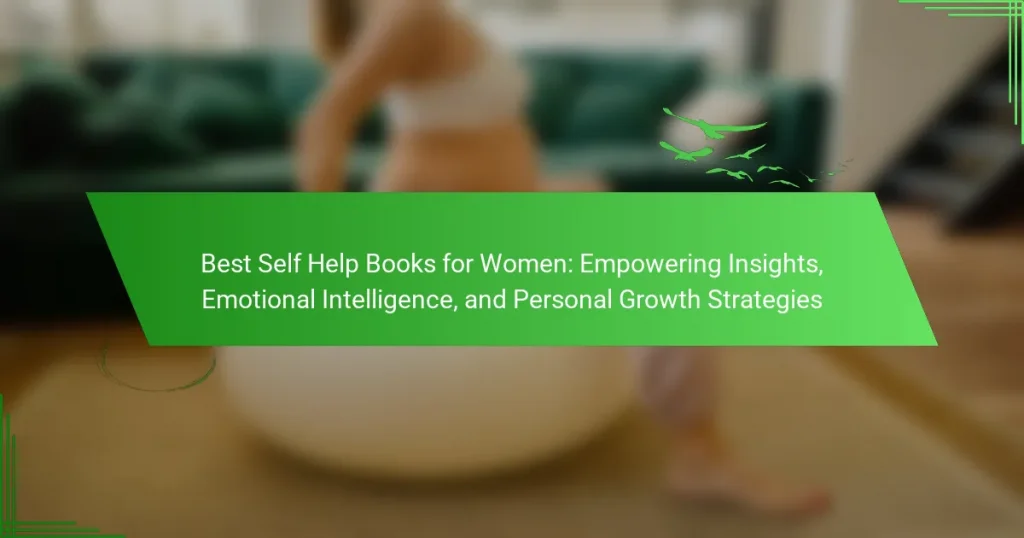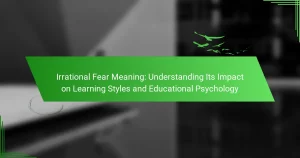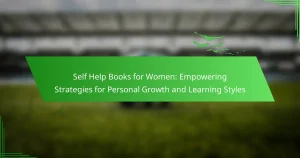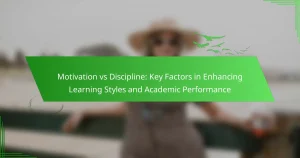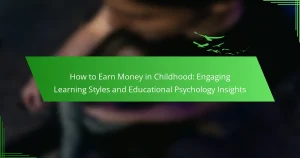Empowerment and personal growth are essential for women navigating life’s challenges. This article explores the best self-help books that emphasize emotional intelligence, resilience, and actionable strategies. Discover relatable narratives that resonate with women’s experiences, as well as lesser-known titles offering unique insights. Learn how to integrate these practical strategies into daily routines for lasting positive change.
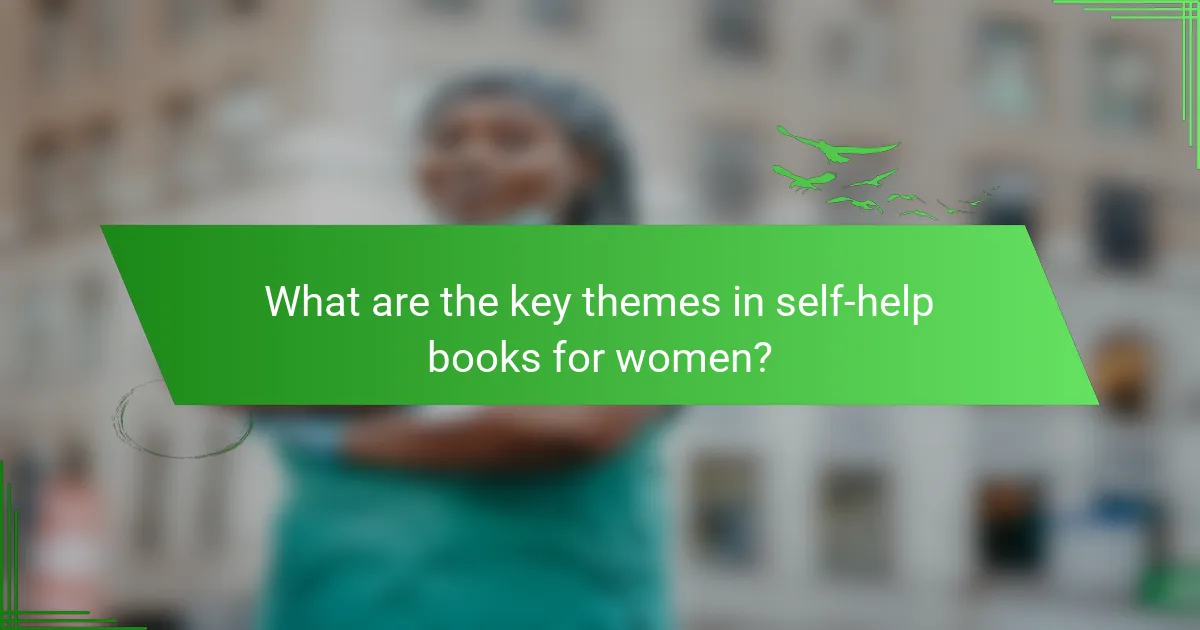
What are the key themes in self-help books for women?
Self-help books for women often emphasize empowerment, emotional intelligence, and personal growth strategies. Key themes include building self-confidence, fostering resilience, and enhancing interpersonal relationships. These books frequently explore topics like mindfulness, self-care practices, and goal-setting techniques. They aim to provide actionable insights that encourage women to embrace their strengths and navigate life’s challenges effectively.
How do emotional intelligence concepts enhance personal growth?
Emotional intelligence concepts significantly enhance personal growth by fostering self-awareness, empathy, and effective communication. These skills enable individuals to navigate relationships and challenges more adeptly. For instance, self-awareness helps identify personal strengths and weaknesses, guiding targeted self-improvement. Empathy allows for deeper connections with others, facilitating collaboration and support. Effective communication enhances interpersonal interactions, leading to more constructive feedback and conflict resolution. Integrating emotional intelligence into daily practices can result in sustained personal development and fulfillment.
What insights do top authors offer for women’s empowerment?
Top authors emphasize the importance of self-awareness, resilience, and emotional intelligence for women’s empowerment. Books like “Untamed” by Glennon Doyle encourage authenticity, while “The Gifts of Imperfection” by Brené Brown highlights vulnerability as strength. These insights foster personal growth and inspire women to embrace their unique journeys. Additionally, “Lean In” by Sheryl Sandberg advocates for ambition and leadership, promoting a proactive approach to career and personal aspirations. Collectively, these works provide actionable strategies for women to navigate challenges and achieve empowerment.
Which authors are recognized for their contributions to women’s self-help?
Notable authors recognized for their contributions to women’s self-help include Brené Brown, Maya Angelou, and Elizabeth Gilbert. Their works focus on empowerment, emotional intelligence, and personal growth strategies. Brené Brown’s “Daring Greatly” emphasizes vulnerability, while Maya Angelou’s “Letter to My Daughter” offers wisdom and strength. Elizabeth Gilbert’s “Eat, Pray, Love” explores self-discovery and healing. These authors provide valuable insights that resonate with women’s experiences and aspirations.
How do learning styles impact the effectiveness of self-help strategies?
Learning styles significantly influence how effectively women engage with self-help strategies. Understanding these styles allows for personalized approaches to reading self-help books, enhancing emotional intelligence and personal growth. Visual learners may benefit from books with diagrams or illustrations, while auditory learners might prefer audiobooks or discussions. Kinesthetic learners often thrive with interactive exercises or journals. Tailoring self-help strategies to align with individual learning preferences can improve comprehension and retention, ultimately leading to more impactful personal development.
What are the different learning styles relevant to personal development?
Different learning styles relevant to personal development include visual, auditory, reading/writing, and kinesthetic. Each style influences how individuals absorb information and develop skills. Understanding these styles enhances the effectiveness of self-help strategies for women seeking personal growth. Visual learners benefit from diagrams and charts, while auditory learners thrive on discussions and podcasts. Reading/writing learners prefer books and written materials, and kinesthetic learners excel through hands-on activities. Tailoring personal development approaches to these styles can lead to more impactful outcomes.
How can tailored approaches benefit women with varying learning preferences?
Tailored approaches can significantly benefit women with varying learning preferences by providing personalized strategies that enhance engagement and retention. These methods acknowledge diverse cognitive styles, enabling women to access empowering insights effectively.
For instance, visual learners may thrive with infographics and diagrams found in self-help books, while auditory learners benefit from audiobooks or discussions. Kinesthetic learners might prefer interactive exercises or journaling prompts.
By aligning content delivery with individual preferences, women can cultivate emotional intelligence and personal growth more efficiently. This customization fosters a deeper connection to the material, promoting sustained motivation and practical application of learned strategies.
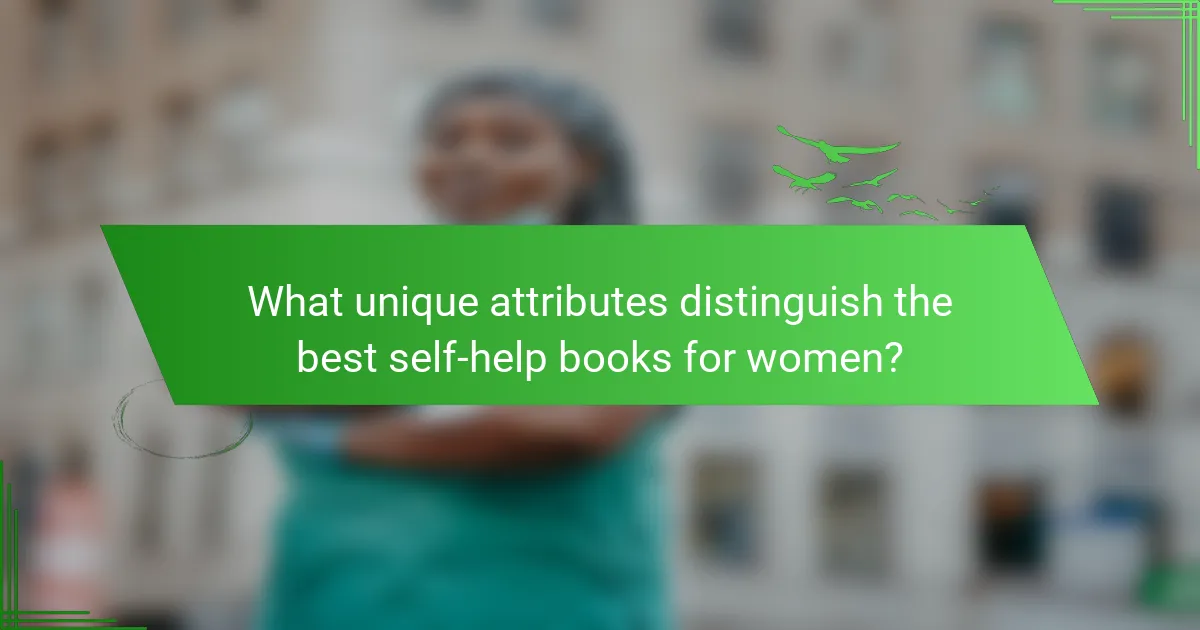
What unique attributes distinguish the best self-help books for women?
The best self-help books for women are distinguished by their unique attributes such as relatable narratives, actionable strategies, and a focus on emotional intelligence. These books often address specific challenges women face, providing insights that resonate deeply. They emphasize personal growth through practical exercises and community support, fostering a sense of empowerment. Additionally, many of these books include diverse perspectives, enhancing their relevance and appeal to a broad audience.
Which books provide actionable strategies for emotional resilience?
Books that provide actionable strategies for emotional resilience include “The Gifts of Imperfection” by Brené Brown and “Option B” by Sheryl Sandberg. These works offer practical insights on overcoming adversity and building emotional strength. “The Body Keeps the Score” by Bessel van der Kolk emphasizes understanding trauma’s impact on resilience. “Emotional Agility” by Susan David provides tools for navigating life’s challenges effectively. Each book empowers readers with strategies to enhance emotional intelligence and personal growth.
How do the best self-help books address societal challenges faced by women?
The best self-help books for women tackle societal challenges by offering practical strategies and emotional insights. They emphasize empowerment, helping women navigate issues like gender inequality and self-esteem. These books often provide relatable narratives and actionable advice, fostering resilience and personal growth. Notable titles include “Lean In” by Sheryl Sandberg, which addresses workplace challenges, and “The Gifts of Imperfection” by Brené Brown, focusing on self-acceptance. Both exemplify how literature can inspire change and promote emotional intelligence among women facing societal obstacles.
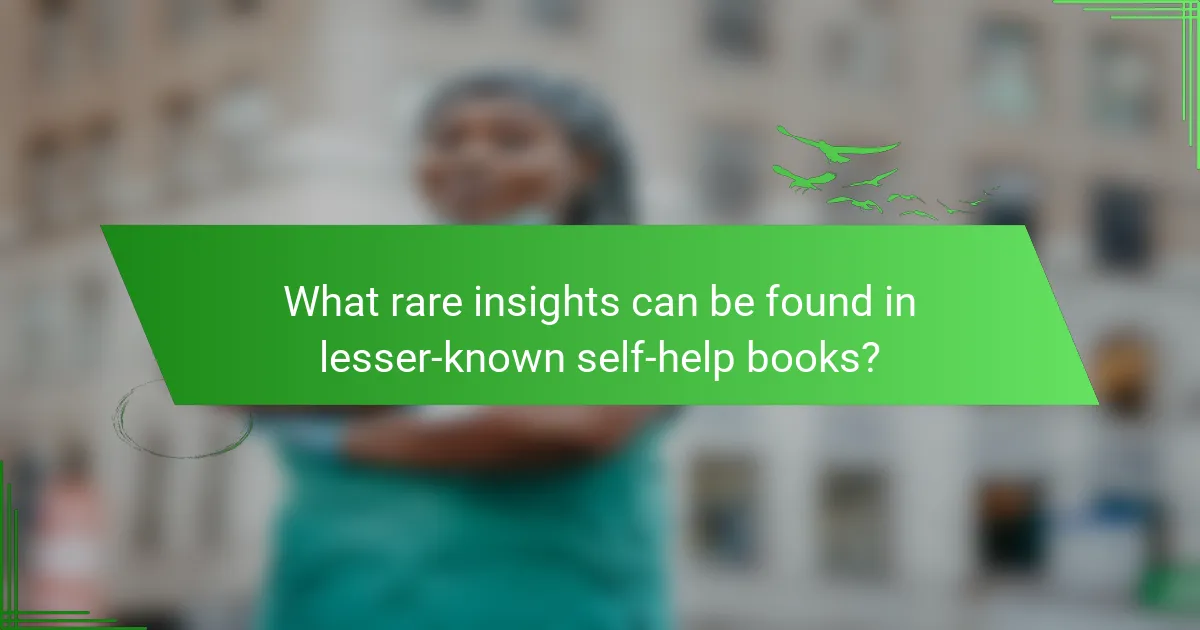
What rare insights can be found in lesser-known self-help books?
Lesser-known self-help books often provide unique insights that challenge conventional wisdom. These books can reveal rare strategies for emotional intelligence, self-empowerment, and personal growth. For example, titles like “The Gifts of Imperfection” by Brené Brown offer unconventional approaches to vulnerability that are not widely discussed. Additionally, works such as “The Art of Possibility” by Rosamund Stone Zander and Benjamin Zander encourage readers to embrace creativity and possibility in their lives. These insights can lead to profound personal transformations, making them valuable resources for women seeking empowerment.
Which unconventional authors offer unique perspectives on personal growth?
Authors like Brené Brown, Elizabeth Gilbert, and Tara Brach offer unique perspectives on personal growth. Their unconventional insights emphasize vulnerability, creativity, and mindfulness, which empower women to embrace their emotional intelligence. Brown’s research on shame and resilience, Gilbert’s exploration of creativity, and Brach’s teachings on self-compassion provide transformative strategies for personal development. Each author challenges traditional self-help narratives, encouraging deeper self-reflection and authentic living.
What niche topics are covered in self-help literature for women?
Self-help literature for women covers niche topics such as self-empowerment, emotional intelligence, work-life balance, and mental health strategies. These books often provide practical tools for personal growth and resilience. Unique attributes include tailored advice for overcoming gender-specific challenges and fostering community support. Rare topics may explore intersectionality in personal development, addressing how various identities influence women’s experiences.
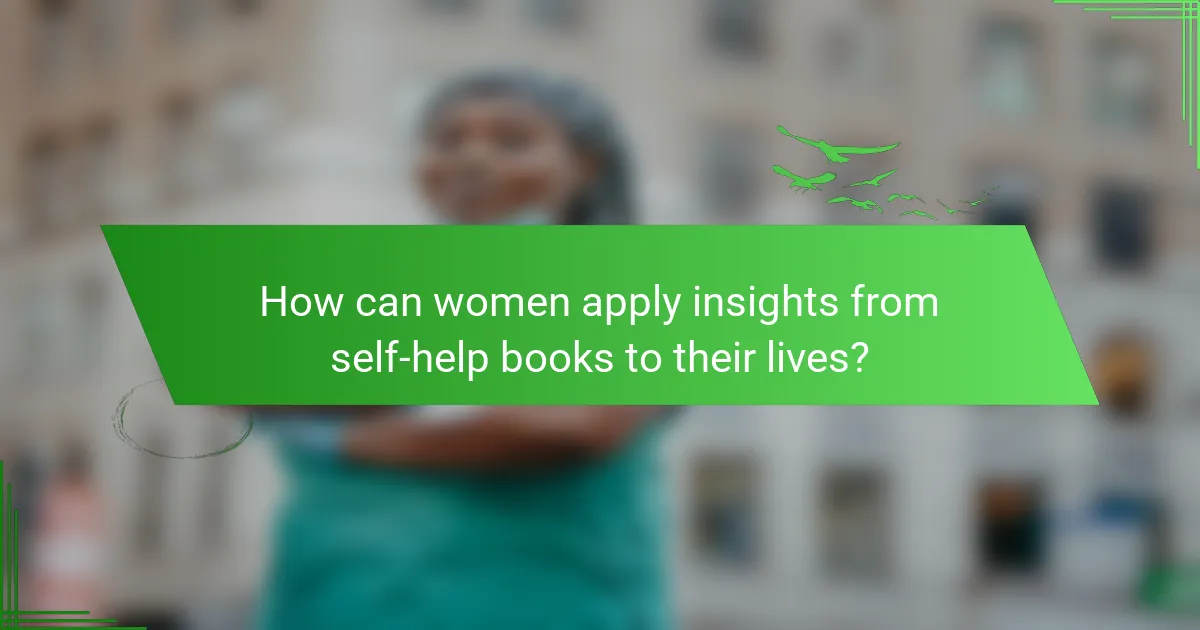
How can women apply insights from self-help books to their lives?
Women can apply insights from self-help books by integrating practical strategies into their daily routines. These books often emphasize emotional intelligence, which helps women understand their feelings and improve relationships. For instance, techniques like journaling and mindfulness can enhance self-awareness and decision-making. Additionally, setting specific goals outlined in these books fosters personal growth and resilience. Engaging with supportive communities or book clubs also reinforces learning and accountability. Ultimately, consistent application of these insights leads to empowerment and positive life changes.
What are the best practices for integrating self-help strategies into daily routines?
Integrating self-help strategies into daily routines enhances personal growth and emotional intelligence. Start by identifying key insights from the best self-help books for women. Schedule specific times for reading and reflection, ensuring these practices become habits. Utilize journaling to track progress and feelings, reinforcing emotional awareness. Engage in discussions with supportive peers to deepen understanding and accountability. Finally, apply learned strategies to real-life situations, increasing their effectiveness and relevance.
What common mistakes should women avoid when engaging with self-help literature?
Women should avoid common mistakes like overgeneralizing advice, neglecting personal relevance, and skipping critical self-reflection. These pitfalls can hinder the effectiveness of self-help literature. Engaging with content that does not resonate personally can lead to frustration and confusion. Additionally, ignoring the unique attributes of one’s own experiences may result in missed opportunities for growth. Prioritizing emotional intelligence and seeking insights tailored to individual circumstances enhances the benefits of self-help books.
How can women evaluate the effectiveness of self-help books on their journey?
Women can evaluate the effectiveness of self-help books by assessing their alignment with personal goals and emotional intelligence development. Consider the book’s practical strategies, relatable insights, and reviews from other women. Analyze how the content resonates with personal experiences and fosters growth. Track progress by applying learned techniques and reflecting on emotional changes. Prioritize books that offer actionable steps and measurable outcomes.
